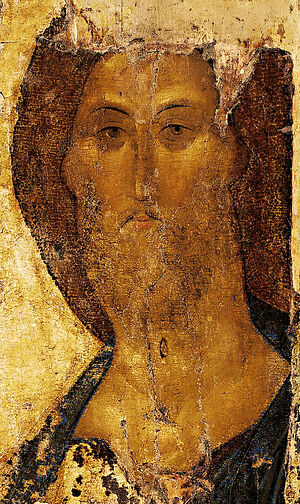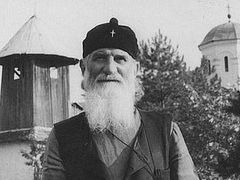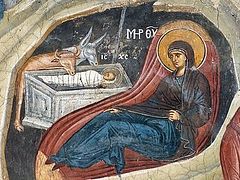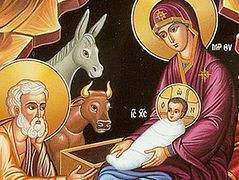 Wikipedia “Thou wast born secretly in a cave, but Heaven spoke through a star and proclaimed Thee to all, O Savior,” the holy Church sings on the eve of the Nativity of Christ. The great mystery of piety: God appeared in the flesh—it was a mystery. The birth of God on earth was preached by the heavens, but this sermon was majestic and silent, because the mouth of Heaven was a star. The event that the entire Christian world now celebrates took place almost completely unnoticed in its time. Did the Greco-Roman world know, did the Jewish world even know that somewhere in a cave, in Bethlehem, God Himself was incarnate, uniting with human nature “without confusion, division, change, or separation?” And did mankind soon turn its attention to the greatest event in its history? It wasn’t years, but centuries before the time when high minds began to theologize about the Incarnation and its significance for mankind.
Wikipedia “Thou wast born secretly in a cave, but Heaven spoke through a star and proclaimed Thee to all, O Savior,” the holy Church sings on the eve of the Nativity of Christ. The great mystery of piety: God appeared in the flesh—it was a mystery. The birth of God on earth was preached by the heavens, but this sermon was majestic and silent, because the mouth of Heaven was a star. The event that the entire Christian world now celebrates took place almost completely unnoticed in its time. Did the Greco-Roman world know, did the Jewish world even know that somewhere in a cave, in Bethlehem, God Himself was incarnate, uniting with human nature “without confusion, division, change, or separation?” And did mankind soon turn its attention to the greatest event in its history? It wasn’t years, but centuries before the time when high minds began to theologize about the Incarnation and its significance for mankind.
The Babe grew, but we don’t know His holy childhood. Only the apocryphal Gospels try to fill in the thirty-year gap, and with miracles. The Divine dignity of the Infant is clearly revealed in the events of which the apocrypha speaks, but the Gospels are silent about all this.
On the contrary, in the Gospels, we see a constant, as it were, concealment of His Divinity. Christ was a hidden God on earth. He asks people to be silent about His miracles. He never says about Himself: “I am God.”
In the manger took place the Divine mingling with human nature. Christ has already gone out to the work of evangelism. The fishers of men have gathered. They left their fishing nets, but have already plunged their Gospel nets into the sea of mankind. They feel the Divinity of their Teacher, but do not yet realize it in all the depth of its meaning. The Incarnation of God and its meaning yet remain a mystery.
But this is the first time that Christ spoke with His disciples about the incarnation and indicated to them its consequences. Where was it? Far from people, far from the cities, in the far north of the Promised Land, in Caesarea Philippi. There Christ was alone with His disciples. Carefully, Christ asked His disciples: Whom do men say that I the Son of Man am? Showing how much He wanted them to confess His Incarnation, He says, “Son of Man.” The disciples responded: John the Baptist, Elijah, Jeremiah, one of the prophets. The Lord does not want to hear such an opinion about Himself from His closest followers. But whom say ye that I am? Your opinion should be different, higher. Thou art the Christ, the Son of the living God, the apostle Peter hastens to answer before the others (Mt. 16:13-16).
What did Peter say? He confessed the Incarnation of the Son of God. Peter said the same thing that John later wrote in his spiritual Gospel, when his nous flew like an eagle above the visible creation: The Word was made flesh, and dwelt among us (Jn. 1:14), although the glory, dignity, and nature of this Word was the glory of the Only-Begotten of the Father. Before it became generally confessed, the great mystery of piety was confessed by the mouth of Peter on behalf of all the apostles. These words: Thou art Christ the Son of God (Lk. 4:41), mean the union of two natures, which the Son of God worked within Himself in a God-befitting manner for our salvation. We should see in Peter’s confession the seed of later Church Christology. Many great Church theologians have profoundly revealed the Christological teaching, but the Christological truth was expressed briefly and quite definitely long before the Council of Chalcedon, when the apostles gathered around Christ Himself in Caesarea Philippi.
It was not flesh and blood, according to the word of Christ, that revealed this great truth to the apostle Peter. Jewish flesh and blood did not accept the Incarnation. For a good work we stone Thee not; but for blasphemy; and because that Thou, being a man, makest Thyself God (Jn. 10:33). The high priest rent his clothes and said: He hath spoken blasphemy… Behold, now ye have heard His blasphemy. What think ye? They answered and said, He is guilty of death (Mt. 26:65-66, Mk. 14:63). “We all expect that Christ will be a man of men,” the Jew tells St. Justin Martyr. And for a long time thereafter, the Semitic element in the Church invented Christological heresies. “The Ebionites … do not accept the union of God and man into their souls by faith,” complains St. Irenaeus of Lyons. The ancient world taught a lot about the Word, but couldn’t say: The Word was flesh. Judea was Deist. The Hellenes, pondering the Logos, fell into pantheism. But Alexandrian syncretism did not come from these two extremes. In the teaching of the Logos began a new era. Philosophy was subordinated to theology. The Incarnate Word began to dwell in the world, in people.
But Christ’s answer didn’t end there. He Himself spoke of the significance that the Incarnation of the Son of God will have for mankind. And I say also unto thee, That thou art Peter, and upon this rock I will build My Church (Mt. 16:18). Your name is Rock, and the Incarnation you have confessed will also be a rock, upon which My Church will be created. Isaiah and David prophesied about the rock. In light of these prophecies, the apostles could easily understand the words of Christ.
The apostles also well internalized His words, and the apostle Peter and the apostle Paul call Christ Himself a Rock. Christ is that Rock upon which the Church is built. But what does it mean to build the Church on Christ? Many holy fathers say that the Church was founded upon the confession of Peter, upon the faith of Peter. What does this mean? How can anything be built upon the theoretical confession of some truth? After all, a new life is being created for mankind, a new mankind is being created. A new life and a new creation are not created by a theoretical truth.
Christ is the foundation of the Church in the very sense in which He is confessed by the apostle Peter. And Peter confessed the Incarnation of the Son of God. The Incarnate Son of God also became the foundation of the Church. Peter’s confession can be called the foundation of the Church in its objective meaning, in its content, because in it is confessed the fact of the Incarnation of God. Not the idea of incarnation, but the very fact of the Incarnation lies at the foundation of the Church. The Church is a direct continuation of the Incarnation, as a building can be called the continuation of its foundation. Hermas saw the Church as a tower under construction. Individual stones were so close together that it was impossible to see where one stone ended and another began. The tower seemed to be made from a single stone. As soon as the stones were put into the structure of the tower, they began to glow; they changed their usual appearance. The Church, according to the apostle Paul, is a new creation.
But the new creation can be compared with the first creation in certain points. Once, God took the dust of the earth and created man. This man was made of the dust of the earth, and he fell into dust, although he was created for incorruption. People bore the image of Adam of the dust. In the Incarnation, God again takes dust, taking flesh from the nature of dust, although from the Most Holy Virgin. A new man is created, with men becoming partakers of the Divine nature.
Once, God breathed the breath of life into the face of man, and man became a living soul. And there was a Divine breathing with the new creation as well, with the words: Receive ye the Holy Spirit (Jn. 20:22)—as a rushing mighty wind (Acts 2:2), and all were filled with the Holy Spirit. The new Adam became a lifegiving Spirit. The old is gone; now everything is new. The former way of life of the old man is laid aside, and the investiture of the new man is accomplished, created by God in righteousness and the holiness of truth. The process of the gradual transfiguration of human nature began with the Incarnation of the Son of God, and the continuation and completion of this process is in the life of the Church. Thus, the Incarnation and the Church are inextricably linked. “The Word, being in the beginning with God, and the Word, being Himself God, Who in the last days, by commingling with the nothingness of our nature, was made flesh in His love for man, and, uniting Himself thereby with man, took upon Himself all of our nature, that through dissolution with Divine nature, human nature might be deified, and by the firstfruits thereof the whole composition of our nature may be sanctified together.”
St. John of Damascus, in his homily on the Transfiguration, and Archbishop Nilus Cabasilas of Thessaloniki refer to the confession of Peter as theology. But the Lord Jesus Christ’s answer to the apostle Peter should also be called high and highly substantive theology. Understood in their indissoluble connection, Peter’s confession and Christ’s reply form a whole system of Christian theology—a single, integral, and harmonious system. In this system, the doctrine of the Divinity of Christ (Christology), the doctrine of salvation (soteriology), and the teaching on the Church (ecclesiology) were harmoniously combined. By the Incarnation the beginning of our salvation is placed, and upon the foundation of the Incarnation the Church, a new nature is created; by the action of grace, men are being healed from sinful corruption and attaining to the fullness of the measure of Christ.
By the rock, the Catholics understand Peter himself, and by the words of Christ, they justify the claims of the Bishop of Rome to the lawless primacy of the Church, and even infallibility. Many of our theologians dispute this understanding of the words of Christ. But the religious feeling that lives by the ideal of salvation and theosis is repelled by the Catholic interpretation because this interpretation wants to make purchases and sales where the greatest religious mysteries are proclaimed. It is the theological-ideological emptiness of Catholic thought that repels the most.
The Church historian Eusebius writes that the ancient Ebionites are so called because of the paucity of their minds—the word means “poor” in Hebrew (Church History 27.1-6). St. Epiphanius of Cyprus explains: “He is truly poor in understanding, and hope, and deed who confesses Christ as a simple man” (Heresies 30.17). The Catholics are the Ebionites of our times. Their ideological poverty is manifest in their interpretation of Christ’s answer in the sense of granting Peter primacy and supremacy in the Church, and to all his successors in the see of the Bishop of Rome. The Catholics don’t want to see anything other than a Church structure, other than an external order and subordination where, according to the Orthodox understanding, deep theological mysteries about the natural unity of Christ with the Church are revealed.
Our theology also understands the Church too externally. The Church is a human institution; its mystical connection with the fact of the Incarnation is not the subject of theological discussion with us. But whoever listens closely to the Church hymns on the feast of Christ’s Nativity learns where the Church sees the pledge of its life and the beginning of salvation for its members. It is precisely today, according to the Church, that the most glorious mystery is accomplished: Nature is renewed and the God-man is the Son of God through His very unification and cojoining with human nature (in the incarnation) wrought by God’s hand.
In the Church hymns on the feast of the Nativity, we hear ideological echoes of the very theology we have spoken about above. According to the word of the Church itself, in the Christmas service, the Church brings the Incarnate Christ “the Orthodox riches of theology, as to the God and Savior of our souls” (on Glory at the Praises). And the richness of this Orthodox theology is in the same great truths that were originally expressed in the Lord’s conversations with His disciples in Caesarea Philippi. “The beginning of the salvation of human nature and the beginning of the life of the Church is laid down in the very fact of the embodiment and Incarnation of the second Hypostasis of the Most Holy Trinity”—this is how we define the “Orthodox wealth of theology.” The ideological-theological content of the Nativity service was given in northern Palestine, where the Lord was alone with His disciples, far from people.
Christ was mystically born of the Most Pure Virgin in the south of the Holy Land; and mystically, in the north of this land, the importance of this birth was theologically defined. For centuries afterwards, Church theologians pondered the mystery of the Incarnation. Who of them had no words on the Incarnation? Sometimes this mystery was even discussed on the squares and in the markets. The mystery of the Incarnation attracts mankind, because without this mystery, there remains for mankind only the dreary corruption of enchanting lusts and the gloomy gates of death. We hymn the Incarnation of Christ, because no matter how much we love our sinful nature, we still long to be comforted by the afterlife.



